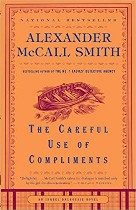 Alexander McCall Smith •
Alexander McCall Smith •
The Careful Use of Compliments •
Isabel Dalhousie is a philosopher by nature, by training, and by profession. As editor of the Review of Applied Ethics, she spends much of her time pondering the ramifications of actions, both her own and other people’s. The phrase “Isabel wondered” appears regularly throughout this series set in Scotland.
Her musings range from the abstract (tattoo art, near-death experiences, the poetry of W.H. Auden) to the intensely personal (the considerable wealth she has inherited, the advisability of offering “gripe water” to calm baby Charlie’s fretful moods, the urban fox whose periodic visits to her garden take on an almost mystical significance). Her psychic energy and moral deliberations often center on her twin nemeses, the predatory Professors Lettuce and Dove. “I’ve been a rather foolish Lettuce,” admits the former in The Lost Art of Gratitude. “His salad days were over,” thinks Isabel. “He’s wilting.”
Isabel routinely gets involved in other people’s business—that of her housekeeper Grace, her lover Jamie, her niece Cat, Cat’s employee Eddie, and various other Edinburghers who enlist her aid in solving problems. But the books are mysteries only in the loosest sense, their plots revolving more around the intricacies of human relationship than actual crimes. In The Careful Use of Compliments, Isabel’s investigation into a painting takes her to the Inner Hebrides island of Jura, with its dramatic landscape of jagged peaks, enveloping mists, and treacherous whirlpools.
Isabel bears a close spiritual kinship to our old friend Mma Ramotswe in her desire to help others, but this isn’t just a Scottish spin on the Botswana stories. McCall Smith has enough imagination to supply countless absorbing scenarios and characters. Long may he write.






Your email address will not be published.